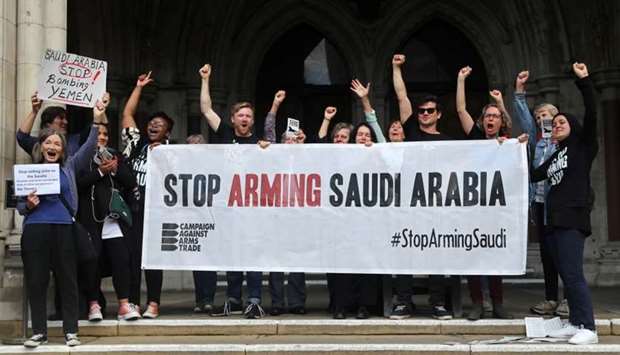* Government stops new arms licenses after ruling
* UK says it will appeal the decision* S.Arabia says stopping arms exports helps Iran
Britain broke the law by allowing arms sales to Saudi Arabia that might have been deployed in the war in Yemen, an English court ruled on Thursday after activists said there was evidence the weapons had been used in violation of human rights statutes.
While the court's decision does not mean Britain must immediately halt arms exports to Saudi Arabia, it does mean that there is a stay on the granting of new export licenses to sell arms to the kingdom - Britain's biggest weapons purchaser.
The United Nations has described the conflict in Yemen, which has killed tens of thousands of people including thousands of civilians, as the world's worst humanitarian crisis.
"The Court of Appeal has concluded that the process of decision-making by the government was wrong in law in one significant respect," said Terence Etherton, England's second most senior judge.
Handing down the ruling, Etherton said the government made "no concluded assessments of whether the Saudi-led coalition had committed violations of international humanitarian law in the past, during the Yemen conflict".
International Trade Minister Liam Fox said he disagreed with the judgment and would seek permission to appeal.
"Alongside this we are carefully considering the implications of the judgment for decision making," Fox said.
"While we do this we will not grant any new licenses for export to Saudi Arabia and its coalition partners which might be used in the conflict in Yemen."
Britain is the world's sixth largest seller of arms, after the United States, Russia, France, Germany and China, according to the Stockholm International Peace Research Institute (SIPRI).
Saudi Arabia accounted for 43 percent of Britain's global arms sales in the past decade. BAE Systems, Britain's biggest defence company, generates 14 percent, or around 2.6 billion pounds ($3.3 billion), of its group sales from Saudi.
The legal action against the British government was brought by the Campaign Against the Arms Trade, which wants to end the global arms trade and argued that British weapons were likely to have been used in Yemen in violation of human rights law.
A Western-backed alliance led by Saudi Arabia and the United Arab Emirates intervened in Yemen in 2015 to try to restore the internationally-recognised government to power after the Iran-aligned Houthis seized the capital, claiming to fight graft.
The war has left tens of thousands of people including civilians and children dead, and has put 10 million people at risk of famine and the world's worst cholera epidemic.
"The decision of the court today does not mean that license to export arms to Saudi Arabia must immediately be suspended," said Etherton, the British judge.
"It does mean that the UK government must reconsider the matter, must make the necessary assessments about past episodes of concern, allowing for the fact that, in some cases, it will not be possible to reach a conclusion."
Rights groups and Britain's opposition Labour Party welcomed the judgment.
Labour said British ministers had wilfully disregarded evidence that Saudi Arabia was violating international humanitarian law in Yemen, while nevertheless continuing to supply Riyadh with weapons.
"UK advice, assistance and arms supplies to Saudi's war in Yemen is a moral stain on our country," Labour leader Jeremy Corbyn said. "Arms sales to Saudi must stop now."
Fox, the trade minister, said Britain had always taken its export control obligations very seriously and would continue to do so. "Our whole assessment has been infused with IHL (international humanitarian law) considerations, indeed everything was looked at through the prism of IHL," he said.

